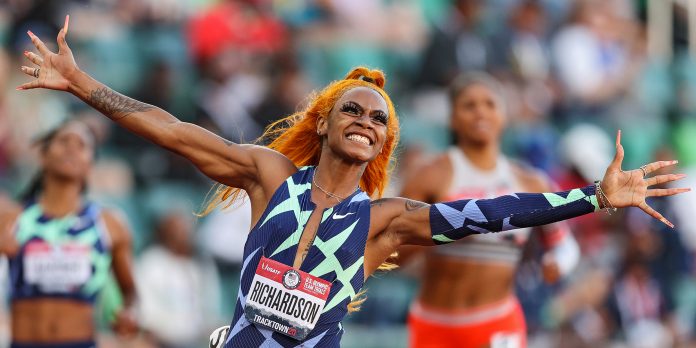Natalia Hernandez
Senior Copy Editor
Sha’Carri Richardson made headlines in late June for her exceptional performance in the prequalifying track and field 100-meter race in Oregon. Richardson’s record-setting time in the Olympic qualifier instantly made her the star-to-beat in this year’s games which began on July 23 in Tokyo. Her flawless composure, style, and speed made everyone excited to watch her undoubtedly sweep the floor in Tokyo with USA Track & Field (USATF).
Just two weeks after becoming the fastest woman in America, the young track star’s dreams were cut short when the news broke that she would face a month-long suspension for a failed drug test containing THC — a chemical found in marijuana. As a result of her one-month suspension that began on June 28, Richardson will not be competing in the 100-meter race in Tokyo.
The gut-wrenching news announced by the US Anti-Doping Agency (USADA) sparked intense backlash throughout the country, raising questions against the merits of the suspension and the rules around it.
Richardson responded to her positive test result for marijuana, explaining that her usage was a coping mechanism after learning about the unexpected death of her biological mother from a reporter the day before the Olympic trials. While opponents say she knew the rules and still chose to do it anyway, the use of marijuana to manage stress, anxiety, and pain relief is nothing new in the world of athletes.
The USADA follows criteria based on the Prohibited List by the World Anti-Doping Agency (WADA) — an organization founded in 1999. Substances that are put on the list break two out of the three categories: “it poses a health risk to athletes, it has the potential to enhance performance, and it violates the spirit of sport.” But recent studies have shown that marijuana isn’t actually a performance-enhancing drug, so what merit do these outdated rules have?
Let’s face it, the rule that Richardson broke to begin with is overtly racist to begin with and her subsequent punishment is a major double standard. Olympic bureaucrats seem to have conveniently forgotten about pretty boy Michael Phelps when pictures surfaced of him smoking from a bong. Although he did face a three-month suspension, he still did not miss any competitions and will still be remembered as the G.O.A.T of the swimming world, while Richardson will likely carry this history around despite her already-established G.O.A.T status.
The overall hypocrisy reintroduced heated discussions on the legality of marijuana. Currently, 18 states fully legalized marijuana use — including Oregon where Richardson tested positive. Current statistics report that the criminalization of marijuana is meant to target the Black community. According to the American Civil Liberties Union, Black people are four times more likely than whites to be arrested for marijuana possession. It’s clear the WADA rules are deeply entrenched in systemic racism. In fact, the WADA was created as a response to the rising “drug hysteria” in the early 1990s — a campaign that was meant to predominantly incarcerate communities of color.
This punishment reinforces the narrative that drugs are rampant in the Black community. It is also an attempt to legitimize the criminalization of marijuana, while whites are more likely to walk free. The criminalization of Black people on marijuana charges has historically created a lucrative prison industrial complex composed of people of color — all while white people and corporations shamelessly profit off of it.
Despite marijuana’s legality and widespread usage to cope with anxiety and trauma, Richardson continues to be shamed into an apology to reinforce a national effort to stigmatize marijuana. She is one of the most qualified athletes to compete in the games and was sure to bring home gold, but it’s a shame that her country refuses to accept those facts and let go of the ridiculously outdated marijuana stigma.
Despite missing the 100-meter race, there was a slight chance of her still being able to compete in the Olympics considering her suspension is up before the 4×100-meter race. But of course, USATF did not select her for the 4×100 relay team because it would be “unfair” to other athletes to only enforce the rules under certain circumstances. Essentially, USATF is using the same rhetoric that “rules are rules” despite the rules being out-dated and racist. If USATF really wanted to support Richardson during this time and be true to their statement that “the WADA THC rules should be reevaluated,” then they should have let her run.
This follows a pattern of US Olympic teams who show a lack of support for Black athletes and their mental health as witnessed through Brianna McNeal, the 2016 Olympic champion in the 100-meter hurdles. McNeal was recently banned from the Olympics for five years due to a missing drug test. She reported to the New York Times that she was recovering from a recent abortion and missed the test date. Richardson’s response that she is “only human” echoes the sadness that is the reality of systemic racism. There is no reason to shame someone for coping with their mental health in a way that was comfortable for them while others are held to different standards. Richardson will forever be in our hearts as “that girl,” but it’s up to the governing body of her country to recognize her as such, abolish the marijuana stigma it has attached to the Black community, and legalize marijuana nationally.












wow i didn’t Expect this article to be this good thank you.
Comments are closed.